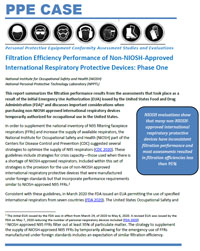PPE CASE – Filtration Efficiency Performance of Non-NIOSH-Approved International Respiratory Protective Devices: Phase One
2020
NPPTL Report Number P2020-0112
NIOSH evaluations show that many non-NIOSH-approved international respiratory protective devices have inconsistent filtration performance and most assessments resulted in filtration efficiencies less than 95%.

This report summarizes the filtration performance results from the assessments that took place as a result of the initial Emergency Use Authorization (EUA) issued by the United States Food and Drug Administration (FDA)1 and discusses important considerations when purchasing non-NIOSH approved international respiratory devices temporarily authorized for occupational use in the United States.
While these international respiratory protective devices included in the FDA’s EUA and OSHA’s enforcement guidelines have similar performance requirements compared with NIOSH-approved devices, NIOSH does not oversee the initial production, regulate sustained manufacturer quality control for these products, monitor post-market quality, or have knowledge about the product’s handling and exposures after leaving the manufacturer’s control. Due to the potential to have these non-NIOSH approved respirators used by workers in the United States, NIOSH designed a process to assess the particulate filtration performance. The goal of the assessment was to provide consumers of personal respiratory protection and other interested parties a point-of-use quantitative assessment of the devices temporarily authorized for use.
Suggested Citation
NIOSH [2020] PPE CASE: Filtration efficiency performance of non-NIOSH-approved international respiratory protective devices: first phase by Andrews A, Powers J, Cichowicz J, Coffey C, Fries ML, Yorio PL, D’Alessandro M. Pittsburgh PA U.S. Department of Health and Human Services, Centers for Disease Control and Prevention, National Institute for Occupational Safety and Health, NPPTL Report Number P2020-0112.
